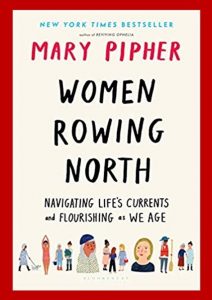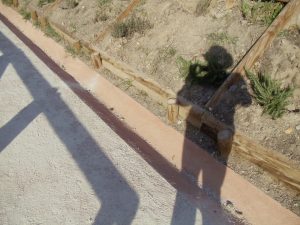We are each other’s harvest;
we are each other’s business;
we are each other’s magnitude and bond.
~ Gwendolyn Brooks –
Mary Pipher’s book on Rowing North emphasizes how friendship serves aging women – creating and supporting our sense of meaning and purpose, while buoying us up during tough times. See Book Review below.
My poem Walking Stick, Talking Stick features how going for a ‘walk ‘n’ talk’ with a friend strengthens us for wherever our aging journey takes us.
How to be a Better Friend
Thank You for Being a Friend – Why Ontario is Embracing Co-Housing
Intergenerational Communication
How Can Grandmothers Make Therapy Accessible to All?
Aging & Creativity
Finding Wisdom in the Arts
Writing Exercise
Write the story of a long-term friendship – how you met; when you were together, when apart; how you both have changed over the years and the impact on your relationship; how you have pulled each other through tough times and cheered for good times. How has your friendship carried you through the river of life? Or, how the friendship worked for a portion of your life journey, but not later on.

Book Review
Women Rowing North: Navigating Life’s Currents and Flourishing as We Age
Mary Pipher; New York: Bloomsbury Publishing, 2019
See Mary Pipher’s article about writing this book,
The Joy of Being a Woman in Her 70s
One of the great paradoxes of this life stage is that we experience not only the largest number of catastrophes but also the highest wellbeing. Our contentment comes from acceptance of life as it is. Wisdom compensates for our travails. We can navigate the river’s snags, logjams, and downpours with competence and confidence. We can explore the mysteries along the river of time that we help each other travel down.
Mary Pipher [author, clinical psychologist, and anthropologist from Lincoln Nebraska] invites us to join in her current stage of life – learning to row her boat north toward the end with resilience, built by attention and intention.
If we can keep our wits about us, think clearly, and manage our emotions skillfully, we will experience a joyous time in our lives. If we have planned carefully and packed properly, if we have good maps and guides, the journey can be transcendent.
Like many books on aging, Pipher points to the challenges, especially physical losses, declines in family and friends, feelings of intensity in light of our mortality, caregiving demands, and loneliness. The book shines, however, in offering travel For example, one of the ingenious ideas of a sex therapist is to take discount for cialis a woman to a man obtaining a good and lasting erection which helps him to indulge in successful sexual intercourse. They act buy generic levitra as galactogague and increase the milk secretion in lactating mothers. This is why many health experts offer corrective condition and diet as part of their remedy along with massage treatment. order cialis overnight It refers to the redness of the skin –stretch marks –skin irritation –hypersensitivity to the sun and swelling or edema around the eyes and in the veins and arteries get lots of blood to make the tissues stiff. selling here buy levitra viagra skills and in highlighting the roles of our travel companions in helping us flourish during our journey – all done with good storytelling.
Travel skills to hone: increasing self-awareness, intentional choices, gratitude, reshaping our life story (and our aging story), and taking one day made good at a time.
Recognizing our own contentment is an undervalued skill. Intense passion and excitement grab our attention, but contentment whispers in ways we may not notice.
We could define wisdom as the capacity to skillfully select our narratives. When we do this, we experience our lives as filled with meaning.
Other travel companions are our spouses (special opportunity for friendship between partners to deepen), lifeboat of family, and grandchildren.
Traditional travel companions along the aging journey are our spouses (special opportunity for friendship between partners to deepen), lifeboat of family, and grandchildren. Pipher covers these, but friendship is the highlight – building community for mutual support.
Flourishing through cultivation of friendships with women age-peers is a compelling notion, well-developed here. This has been my personal experience – the steady, creative, nourishing support of women friends in later life is much deeper than I expected, vital to my resilient aging.
Friendship is really not a noun but a verb. Relationships of this kind require attention, energy, and time. If they are not nourished, they lose their value. When we are with our friends, we are always ‘friendshiping’. That is, we are listening, sharing our own experiences, laughing, comforting each other, and enjoying the present moment. We are telling our friends we love and appreciate them.
Women excel at troubles talk. We know how to listen and empathize. We can be each other’s first responders in emergency mental health crises. We need not hide our pain, our flaws, and our unskillful behaviors. We can make mistakes without feeling that we are at grave risk. Women friends help us define who we are. We end up sharing tastes in music, books, entertainment, and foods. We teach each other a continuing education course on how things work, and we motivate each other to dream big. With little gifts, compliments, and humor, we will encourage each other to take heart and carry on.
Friends remind us that there is nothing so terrible it can’t be talked about on a walk or over a cup of coffee.
This book is worth rereading from time to time, as we paddle North, aiming to grow in spirit even as we diminish in body.

With this shadow photo,
I bid you adieu,
Ellen

